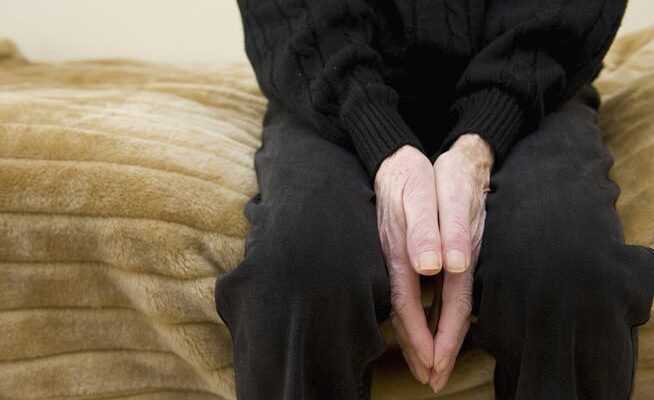The Zurich cantonal council wants to legally oblige all homes to enable residents to carry out assisted suicide. However, a referendum could be held against Monday’s decision.
Older people sometimes have to leave their homes today if they want to take advantage of euthanasia.
The cantonal council got caught up in an ethical dilemma on Monday morning. The trigger was a parliamentary initiative by Hanspeter Göldi (SP, Miles). His demand: Retirement and nursing homes should be legally obliged to enable their residents to have euthanasia in the home. A demand that not only divided the parties, but also led to a heated debate in Parliament, which ultimately led to accusations of dictatorship.
When it comes to euthanasia, discussions quickly become emotional. In this case, however, the matter was also quite tricky, because opponents and supporters alike argued to stand up for civil liberties.
Göldi and his comrades-in-arms wanted to put things right. Today it is the case that not all homes grant access to euthanasia organizations. In this case, for an assisted suicide, the residents have to leave the home to die.
For Jeannette Büsser (Greens, Zurich), this is an intolerable situation. As a professional assistant, she has repeatedly observed how the home becomes a new home for many residents. It shouldn’t be the case that seriously ill people have to leave their familiar surroundings shortly before they die. Especially since assisted suicide is allowed in Switzerland. “One may find euthanasia good or bad, but that is not the point here. Rather, it is about the fact that freedom rights, which apply to everyone, must not be arbitrarily restricted.”
Get help here:
If you are having suicidal thoughts or know someone who needs support, please contact the counselors at Offered hand. You can these confidential and 24 hours a day by calling 143 reach. Special help for Children and young people are available under the number 147.
Liberal minds in particular should be convinced by this line of argument, one would think. But it was the FDP that decided to vote on this issue. Because the opponents also had valid arguments. Above all, they brought up the rights of the institutions. What about a home run by a religious body that refuses euthanasia? Should she really be forced to allow assisted suicide in her home? And doesn’t that contradict freedom of religion?
Yes, according to Linda Camenisch (FDP, Wallisellen). Of course, no one is denied the right to euthanasia. “But it doesn’t need a Lex Exit.” From their point of view, such a law meant a disproportionate intervention in the corporate culture of the homes. In addition, everyone can freely choose in which home they want to live. Above all, it is important that the homes make transparent how they would deal with the question of euthanasia. Camenisch therefore spoke out in favor of the government council’s proposal:
The Health Directorate recommends that the homes should specify in their mission statements whether or not they allow assisted suicide on their premises. This is also how it is handled in other cantons.
Since, according to a survey by the Curaviva home association, 75 percent of Zurich homes allow euthanasia, there is enough choice for people who want to make use of it.
“The choice of home is not so free”
All valid arguments, which were well countered by the opponents.
Initiator Göldi found that transparency and free choice of home sounds good, but the reality is often different. Admission to the home usually works like this: an elderly person has to go to the hospital because of an illness, and there you realize that this person can no longer live alone. “It’s not like the hospital’s social worker then presents the patient with a list of ten homes to choose from.” Most of the time, there is only one or two institutions to choose from, if only for reasons of space. In addition, those affected often wanted to go to a home that was close to their relatives.
That is why the right to euthanasia must be guaranteed everywhere, said Göldi. “The self-determination of the organization must not be placed above the self-determination of those affected.”
But the opponents also raised legitimate objections to this. After all, institutions are made up of people. What about the rights of those residents who do not want to live in an institution where assisted suicide is practiced? And what about nurses who refuse euthanasia?
Although the act itself is left to the relevant organizations, the employees come into contact with the matter at least indirectly. Hanspeter Amrein (SVP, Küsnacht) therefore accused the supporters of a lack of sensitivity. “Carers must have the opportunity to work in institutions that do not offer this.” In his zeal, Amrein made a mistake in his choice of words when he said that the advocates would “rape the employees to witness a suicide”. His party colleague Maria Rita Marty (Volketswil) even spoke of a dictatorial approach.
There could be a referendum
Irrespective of these gaffes, the votes revealed the dilemma: Whose liberties are to be given greater weight? Those of the employees or those of the residents who want to take advantage of suicide assistance?
Thankfully, democracy has created a convenient way to answer tough questions: the vote. In this, Parliament then voted 92 to 76 in favor of the change in the law. The euthanasia organizations Exit and Dignitas reacted to the decision in press releases.
But the dispute is probably not over yet. Members of the SVP and EPP spoke of a referendum. The people should have the last word on this important and sensitive issue.
